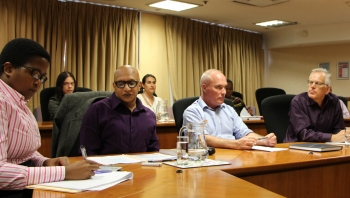Tshwane's black men who have sex with men in urgent need of HIV/AIDS services
DATE: 12 March 2013

From left to right: Prof. Vasu Reddy, HSRC, Prof. Theo Sandfort, New York State Psychiatric Institute and Columbia University, New York and Dawie Nel, OUT LGBT Well-being, Pretoria at the launch of the study.
HIV rates among gay men and other men who have sex with men (MSM) in Tshwane resemble to those in pregnant young women. HIV rates among this population are notably higher than that among men of the same age in the population in general. In a new study among 480 black MSM in the City of Tshwane Municipality in the Gauteng province, it was found that that 30% were HIV positive.
The study was conducted by the Human Sciences Research Council (HSRC) and Columbia University, in collaboration with OUT Well-being, and funded by the US National Institute of Mental Health.
Professor Vasu Reddy of the HSRC, one of the lead investigators of the study, says gay men and MSM are considered part of a vulnerable population facing higher HIV risk, yet very little data exists on this group, making it difficult to offer appropriate prevention and treatment to these men.
For this study, men were recruited from various parts of the municipal area using Respondent-Driven Sampling. The majority of men were between 18 and 30 years of age. Over half of the men in the study had a regular male partner. All men participated in a survey and were tested for HIV.
The study found that although men in the study used condoms, many engaged in anal sex without consistently protecting themselves. About half of the men reported having unprotected anal intercourse in the preceding year. About 20% of the men in this study engaged in sex with both men and women; around half of the men who engaged in vaginal intercourse with women in the preceding year had done so without using condoms.
Many men in the study indicated that they wanted to learn more about HIV and AIDS. The study’s findings suggest that many of the participants were unclear about the behaviours that put them at risk and how they can protect themselves. For instance, a third of the men thought that it is safe to use a condom more than once, while two-thirds of the men did not know that anal sex is more risky than oral sex. Although more is needed than just information, resolving misunderstandings like these is likely to decrease men’s sexual risk taking.
While many men in the study (75%) reported having tested for HIV at least once, just over a third of the men tested in the preceding six months. Very few of the HIV-positive men knew that they were positive.
“This strongly confirms the need for MSM to test frequently and to get into treatment programmes as soon as possible once they are found to be HIV positive. This would enable men not only to take care of their own health but also to help their community” said Reddy. “It is important that testing and care facilities recognize this and provide support to MSM in a non-stigmatising, respectful way.”
Prof Theo Sandfort from Columbia University, the principal Investigator of the study said, “Our study’s finding clearly illustrate that MSM in Tshwane are greatly at risk of HIV infection. As a significant percentage of these men also have sex with women, their high rates of infection also impact on women getting infected. The high HIV prevalence is especially worrying in light of on-going risk practices.
“I hope that by raising awareness of the high HIV prevalence among this group, the study might contribute to an improved awareness of the risks involved in unprotected sex. Improved access to condoms and water-based lubrication could further promote safer sexual behaviour” said Sandfort.
Note to news editors
For interviews or further information:
- Prof. Theo Sandfort, New York State Psychiatric Institute and Columbia University, New York, tgs2001@columbia.edu
- Prof. Vasu Reddy, Human Sciences Research Council, Pretoria, South Africa, +27 82 3372057, vasureddy@hsrc.ac.za
- Dawie Nel, OUT LGBT Well-being, Pretoria, South Africa, +27 83 379 2488, neld@out.org.za
